hankyoreh
Links to other country sites 다른 나라 사이트 링크
[Reportage] Citizens gather for 1,400th Wednesday demonstration in front of Japanese Embassy
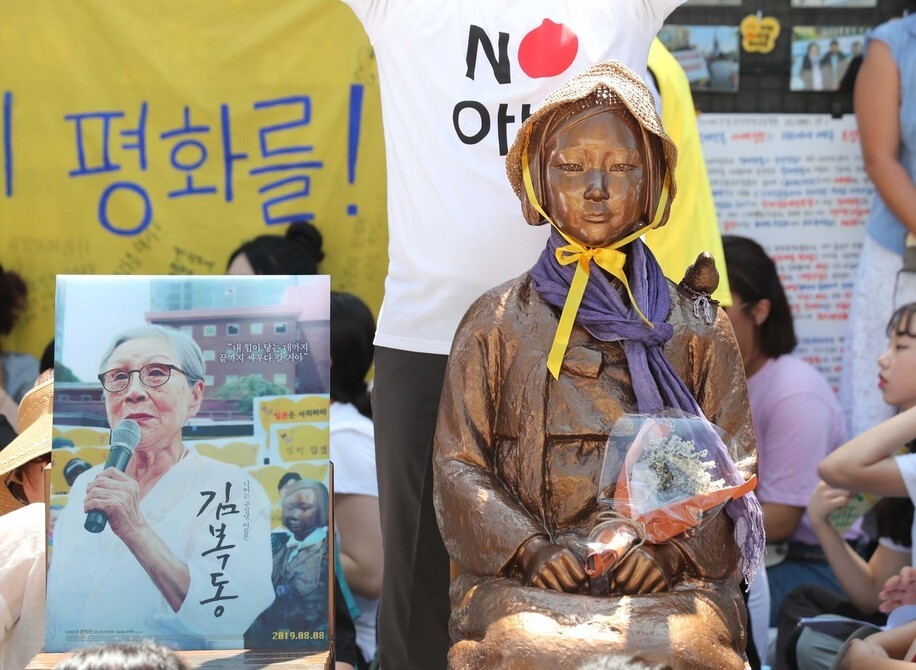
“I don’t think of it as anything special just because today is the 1,400th time. I just came here today the same as I do every week. All I wish for is to receive an apology and resolve this as soon as possible,” said Gil Won-ok, 91, one of less than 20 remaining survivors of Japanese sex slavery known as the comfort women. Although her memory has become weak to the point that she has trouble remembering the late Kim Bok-dong, who was her best friend, Gil sat firmly in the blue chair prepared for her next to the stage even as the daytime temperature soared to 36 degrees Celsius.
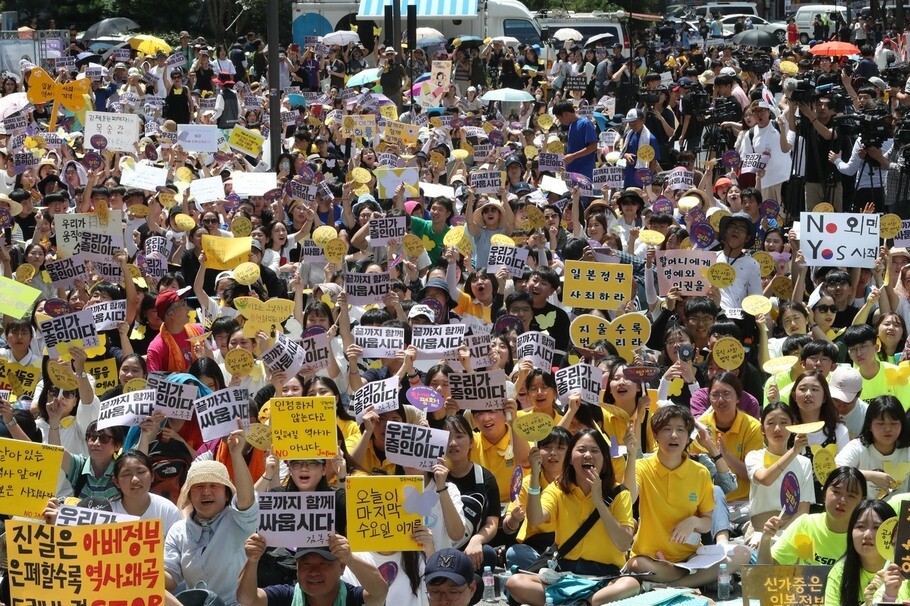
At 12pm on Aug. 14, the 1,400th iteration of the “Regular Wednesday demonstration for a resolution to the issue of Japanese sex slavery” was held in front of the former Japanese embassy to Korea in Seoul’s Jongno District. This was also “International Memorial Day for Comfort Women,” an occasion to commemorate the day 28 years ago when the late Kim Hak-sun first gave testimony on the harm she suffered as a comfort woman. Approximately 20,000 people (organizer estimate) took part in the event alongside Gil.
What the Wednesday demonstration means to you
When the Hankyoreh asked her to fill in the blank in the sentence “To me, the Wednesday demonstration means ______ ,” Gil, who had been speaking in a composed voice, closed her mouth and stared at the empty space, unable to find any words. However, the blank space left empty by her silence was filled with messages from the public.
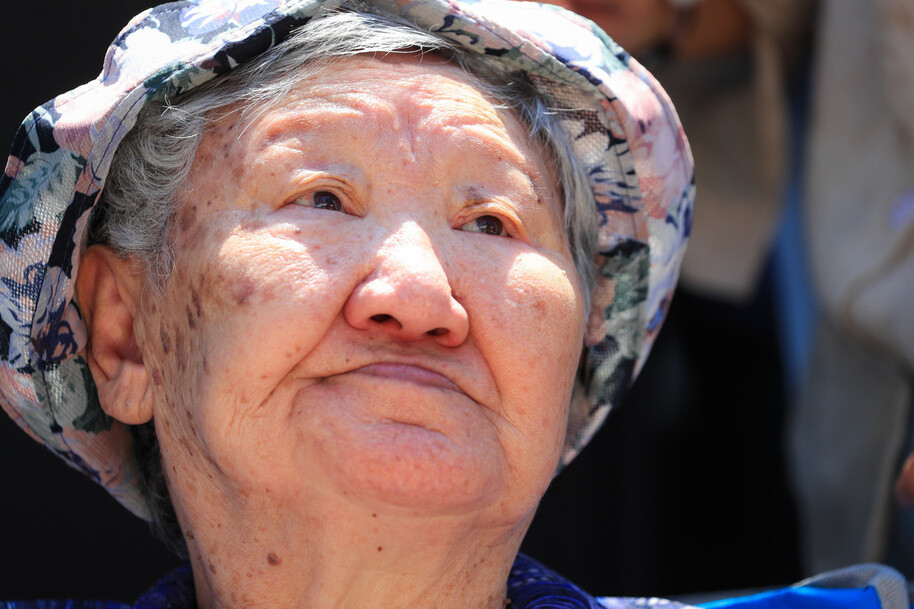
Kim Hyeon-suk, 42, who showed up with her 10 year-old daughter, said “To me, the Wednesday demonstration means ‘feeling sorry.’ I usually take a lot of interest in social issues, but the 1,400th Wednesday demonstration is the first one I have come to, so I feel very regretful.” She went on to say, “From now on I will keep coming here to provide support to these women.” Kim Mi-jeong, 21, stated, “To me, the Wednesday demonstration means ‘achieving justice.’ After attending the Wednesday demonstration, I began to take an interest in volunteer work at the House of Sharing and lectures on the comfort women issue. When put together, these actions will make it possible to achieve justice by pressing Japan for an apology.”
Fujiwara Satoshi, 59, a high school teacher who had flown in from Saitama Prefecture, said, “To me, the Wednesday demonstration means ‘the starting point of peace.’” Fujiwara, who has attended the Wednesday demonstration around 10 times, added “I believe that taking the time to think about these women, who were the weakest victims of the war, and paying tribute to their lives is the starting point for peace. Relations between Korea and Japan are not good at the moment, but when I arrived here I felt that both the Japanese and Korean people are heading towards the same place. I am angry at the Japanese government for refusing to change.”
Lee Jin-yeong, 17, a student at Inmyeong Girls’ High School in Incheon, stated, “To me, the Wednesday demonstration means ‘hope.’ I felt hope when I saw so many people gathered together.” She then said, “I think the Wednesday demonstration is a hopeful step towards receiving an apology from Japan and resolving the issue of legal compensation.” Kim Gye-jae, 66, who has volunteered at the Wednesday demonstration since 2005 and attended over 500 events, said, “To me, the Wednesday demonstration means ‘gratitude.’” As for the reason, she explained, “Through the Wednesday demonstration, I have been able to repay at least some of the debt that I owe to society.” At the demonstration, people held up handwritten signs with slogans such as “We are witnesses” or “Let’s fight to the end,” and chanted “The Japanese government must apologize.”
Gatherings in 57 locations across 37 cities in 12 countries including Japan, the US, Taiwan, Australia and 13 Korean cities, lent their support to the 1,400th iteration of the Wednesday demonstration.
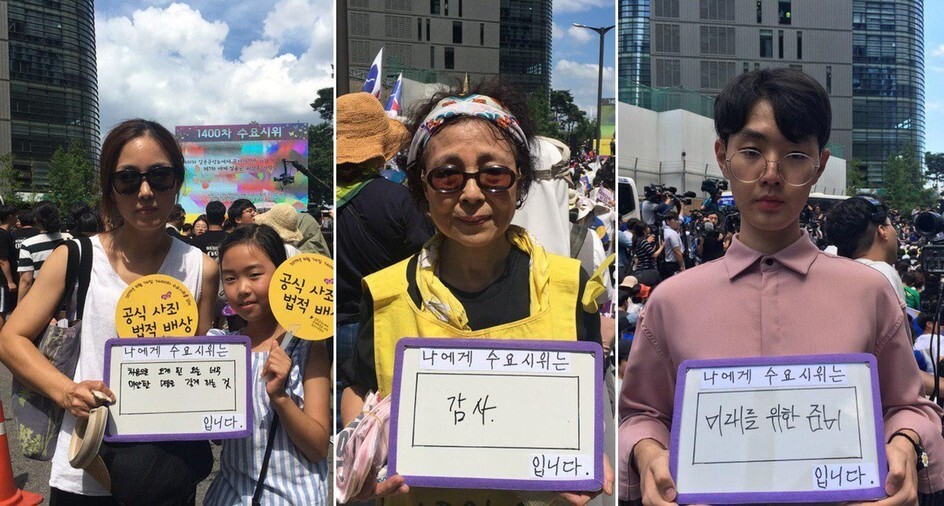
Going beyond Korea to encompass people in Japan and around the world
“The Wednesday demonstration has created a ‘with you’ movement that goes beyond Korea and encompasses people in Japan and all around the world,” said Justice for the ‘Comfort Women’ (a civic group). “The Wednesday demonstration has formed a coalition to eradicate wartime sexual violence, and provides hope to victims of sexual violence to reclaim their independence.” Kim Gyeong-ae, 91, another former comfort woman, showed up near the end of the demonstration.
People also gathered around the “Statue of Peace.” Some left wreaths of white flowers, and one person wrapped a purple scarf around the statue’s neck. Yoo Yeo-ul, 12, who had come from Pyeongtaek in Gyeonggi Province, placed a straw hat she had recently bought on the statue’s head. “The sunshine is so strong that I thought she (the statue) would be hot, so I brought a hat from home,” Yoo said.
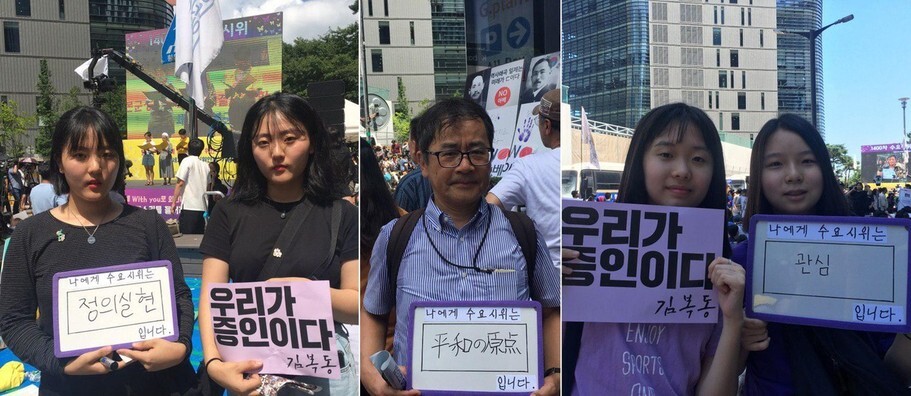
Although the Wednesday demonstration is spreading a message of peace around the world, the people agreed that it should come to an end at some point. “I never imagined it would take this long to reach a solution,” said Kim Heung-yeol, 53. “Japan should apologize quickly so that this can be resolved as soon as possible.” Kim Hye-won, 84, is a founding member of the Korean Council for the Women Drafted for Military Sexual Slavery by Japan and a regular attendee of the Wednesday demonstration ever since the first event was held. “I hope that we can receive a sincere apology from Japan and put an end to the Wednesday demonstration,” she said. “To me, the Wednesday demonstration means ‘the core of my struggle.’ Although the Wednesday demonstration was a lonely movement at the beginning, I am proud to see so many young people showing up today. I want to applaud you all.”
The Wednesday demonstration on Aug. 14 ended with a chant of the seven demands made towards the Japanese government. “Acknowledge your war crimes.” “Reveal the truth.” “Make an official apology.” “Provide legal compensation.” “Punish war criminals.” “Record historical facts and provide education about them.” “Establish a monument of peace and a history museum.” This is the 1,400th time these slogans have been chanted.
By Oh Yeon-seo, Kim Hae-yoon, and Kim Yoon-ju, staff reporters
Please direct comments or questions to [english@hani.co.kr]

Editorial・opinion
![[Column] Park Geun-hye déjà vu in Yoon Suk-yeol [Column] Park Geun-hye déjà vu in Yoon Suk-yeol](https://flexible.img.hani.co.kr/flexible/normal/500/300/imgdb/original/2024/0424/651713945113788.jpg) [Column] Park Geun-hye déjà vu in Yoon Suk-yeol
[Column] Park Geun-hye déjà vu in Yoon Suk-yeol![[Editorial] New weight of N. Korea’s nuclear threats makes dialogue all the more urgent [Editorial] New weight of N. Korea’s nuclear threats makes dialogue all the more urgent](https://flexible.img.hani.co.kr/flexible/normal/500/300/imgdb/original/2024/0424/7317139454662664.jpg) [Editorial] New weight of N. Korea’s nuclear threats makes dialogue all the more urgent
[Editorial] New weight of N. Korea’s nuclear threats makes dialogue all the more urgent- [Guest essay] The real reason Korea’s new right wants to dub Rhee a founding father
- [Column] ‘Choson’: Is it time we start referring to N. Korea in its own terms?
- [Editorial] Japan’s rewriting of history with Korea has gone too far
- [Column] The president’s questionable capacity for dialogue
- [Column] Are chaebol firms just pizza pies for families to divvy up as they please?
- [Column] Has Korea, too, crossed the Rubicon on China?
- [Correspondent’s column] In Japan’s alliance with US, echoes of its past alliances with UK
- [Editorial] Does Yoon think the Korean public is wrong?
Most viewed articles
- 1‘We must say no’: Seoul defense chief on Korean, USFK involvement in hypothetical Taiwan crisis
- 2N. Korean delegation’s trip to Iran shows how Pyongyang is leveraging ties with Moscow
- 3‘Weddingflation’ breaks the bank for Korean couples-to-be
- 4[Reportage] On US campuses, student risk arrest as they call for divestment from Israel
- 5Amnesty notes ‘erosion’ of freedom of expression in Korea in annual human rights report
- 6[Column] Park Geun-hye déjà vu in Yoon Suk-yeol
- 7Korea sees more deaths than births for 52nd consecutive month in February
- 8[Editorial] New weight of N. Korea’s nuclear threats makes dialogue all the more urgent
- 9Will NewJeans end up collateral damage in internal feud at K-pop juggernaut Hybe?
- 10[Guest essay] The real reason Korea’s new right wants to dub Rhee a founding father